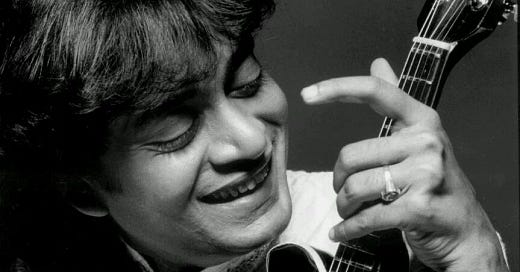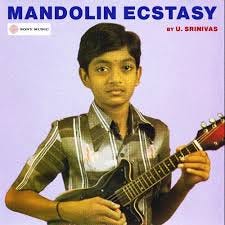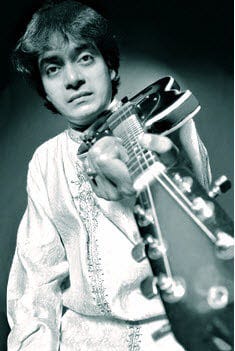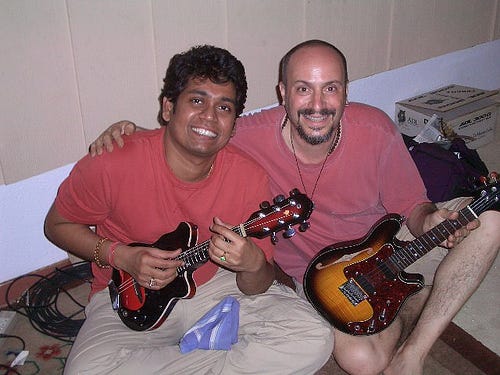U. Srinivas – The Sublime Technician of the Sacred
Remembering the “Adorable Child Prodigy” of the Electric Mandolin on the Anniversary of his Auspicious Appearance - 28 February 1969
Like most kids growing up in America in the 1960’s I was obsessed with the electric guitar until witnessing the Father of Bluegrass, the great Bill Monroe playing the mandolin live at the Expo World Fair in Montreal. From that point on, the mandolin became my passion and I listened to every mandolin picker I could find, from the ragged blues of Yank Rachell, to the Texas swing of Tiny Moore, to the classical finesse of Hugo D’Alton, to David Grisman’s progressive Dawg Music to the exotic choro music of Brazil’s Jacob de Bandolim. Oh and Frank Wakefield’s eccentric inventions too. So, when I heard about “the skinny Indian kid with the ‘baby guitar’” from a saxophonist friend who claimed he “took no prisoners” at the Berlin Jazz Festival in 1983, I quickly tracked down an obscure double album of Carnatic mandolin music with a photograph of the twelve-year old “Adorable Child Prodigy” on its cover.
“Eddie van Halen, eat your heart out,” Beatle George Harrison reportedly said in 2001, having stumbled upon one of Srinivas's albums. "George Harrison's favourite piece of Indian music was Mandolin Ecstasy, an album recorded by a child prodigy from Madras called U Srinivas at the age of 13. It was, like, my dad's favourite album of all time," said Dhani Harrison.
One blast from the lightning fast fingers of “Mandolin” Srinivas (yes, his name actually became synonymous with the instrument he played!) climbing the frets of his peculiar instrument in leaps and bounds instantly convinced me that this was truly a unique and pristine expression of the universe. I even thought that the letter U, which stood for his family name, Uppalapu, must be short for “Universe.”
A few years later I saw that Srinivas was coming to my town. I was living in Milwaukee at the time and went down to Alverno College to sit amongst the predominantly Indian crowd to have my little mind blown. The spellbinding ragas that Srinivas wove quickly refreshed the tired minds and weary souls of the audience. His group displayed an otherworldly telepathy and mercurial virtuosity. The science (often referred to as “the calculations”) behind the soul of this music, as well as the discipline needed to play it, was truly astounding.
Sometime in the mid-nineties I recorded The Cherry Electric, an album of mandolin instrumentals played on a well-worn 1957 4-string Fender electric “mandocaster.” I dedicated the music to the great world music/free jazz trumpeter Don Cherry and the maestro of Carnatic mandolin, U. Srinivas.
A few years later I saw Srinivas again, joined this time by his younger brother, U. Rajesh (a phenomenal musician in his own right) at New York’s Ethical Cultural Center. The two brothers playing together was like watching the four arms of Lord Ganesh perform dazzling magic tricks.
After the show I stood in a long line to meet the maestro and give him a copy of my album. Sitting on the stage, dressed in white, surrounded by a handful of small Hindu deities and photographs of his gurus, he smiled and was grateful to his many adoring fans. I was surprised to discover that Rajesh already had my album and he enthusiastically invited me to visit them whenever I came to India.
U. Rajesh & JK in Chennai
A few months later I flew to Chennai and enlisted in “Carnatic boot camp,” practicing nearly six hours a day, learning new scales by the score. I was fortunate to visit Srinivas and Rajesh at their beautiful home, where I was met by a formidable Doberman growling in the courtyard. We sat in the outer room, Srinivas’ “Hall of Fame,” which was lined with cases full of awards, gleaming plaques and photos, all honoring the “Adorable Child Prodigy.” Over cups of delicious coffee with milk and sugar we talked mostly about music. There were lots of smiles, laughter, handshakes and bows. Beyond his graceful manner and fantastic music (whether playing solo, or with his brother or as a member of John McLaughlin’s Remember Shakti) it was apparent Srinvas was a magnificent spirit.
The great jazz saxophonist Ornette Coleman once told me that I didn’t chose the mandolin, it chose me “to sing its ancient melodies through.” Perhaps we are all channels for something greater than we’ll ever know. If that is the case, U. Srinivas was truly a sublime technician of the sacred.









Thanks for this Mr Kruth…fascinating!